Early stage marketing is both exactly like and somehow also nothing like marketing at a later stage company. What do I mean? Read on.
One of our values at Gradient Works is "Pursue the gradient." Based on the mathematical concept of the gradient, it really means that we're always learning and improving.
Our leadership team compiles a weekly report every Friday, and we each include a TWIL section (this week I learned). It's been a great way to track how we've evolving over time.
Every now and then, I sit down to think more deeply about the bigger lessons I've learned recently. Early stage startups provide A LOT of opportunity for learning. No matter how many times you've done something, it lands a bit differently in this context.
So, this year I’ve learned…
Early stage marketing is a beast. A while back, I wrote a post about blank slate marketing (still waiting for that phrase to take off, but they can’t all be bangers). What even is marketing when you’re starting from a totally blank slate?
Well, our slate isn’t blank anymore, though a lot of those blank slate lessons still apply.
Just about a year ago, I published another post about what we’d learned after a year of marketing Gradient Works. While I strive to be transparent about our progress and our challenges, it’s harder to do now - partly because there is so much more to do, but also because the bigger your company gets, the harder transparency is. So in the spirit of that early transparency, here’s what we’ve learned since last time we talked.
What have I learned?
You need a point of view
Early stage marketing is less about marketing a product or a company (because no one cares about those things yet), and more about marketing a point of view. When we sell our point of view (POV), it’s easier to sell our product.
Sales is focused on the close, so they often think in terms of objections from prospects. CS is focused on support and retention, so they often think in terms of customer problem areas. Product is focused on roadmap, so they think about what the product is missing and what it could do. So it’s my job - both as head of marketing and as a founder - to take the 30,000-ft view and communicate that POV proactively, not reactively.
We’ve gotten lots of positive feedback lately on our point of view - both that we have one, and that we articulate it clearly and repeatedly. And we’ll continue to refine it, to figure out what we have to say, when we need to say, and how we can say it to the people who might respond to it.
Content takes so much time
We started our Up and to the Right newsletter two years ago this week! Before we had a product or employees or really much of anything beyond an idea of the kinds of problems we wanted to solve, we started that newsletter to test out our ideas and share our progress with our early supporters. If you want an early retrospective of what we learned in the first year of our newsletter, read this. And we still publish Up and to the Right, but we’ve moved to a monthly cadence. There’s a lot more to do these days.
Writing blog posts takes time. And if you look back at the blog, you can see how we’ve increased and decreased content production over time. Sometimes, other things take priority. Sometimes we can find a good source of content besides me. It ebbs and flows, and that’s okay as long as we keep it up. Right now, we’ve committed to writing two posts a week, and so far, it’s working well.
Longer-form content is another thing. My background is in long-form content (a dissertation counts as long form, right?). I’ve run content marketing teams and produced millions of words in my lifetime. But creating good long-form content is hard, y’all. You need to come up with something that is interesting, unique and valuable, because you’re asking people to commit real time - and often their email address - to reading it. You owe them quality. We’ve created half a dozen great longer pieces that generate new inbounds every single day. There’s lots more to come there, because I still think long-form downloadable content is a useful resource and an effective marketing tool.
But social media is the worst. We all know short things are harder to write than long things. And trying to stand out on LinkedIn is nearly impossible, unless you’re prepared to spend hours on it and commit crimes of broetry. So that’s still a work in progress.
But content is also so important
I’ve written about SEO here before, and how important SEO is to a new company. I love to look back at this post, which was written in June 2021. It’s so cute! Our website was not even a year old at the time, and our inbound organic traffic was small.
Look at this chart. It shows organic search traffic coming to our website for the first 9 months we existed.

Now look at this one. This shows our organic search traffic now. I highlighted the area shown in the first chart in pink here. See, it’s cute, right? We’ve grown so much!

(This is not the topic of this post at all, but these two charts side-by-side are such a great example of how changing the vertical scale of a chart makes it read so much differently.)
So if you’re just starting out, or if you’re changing directions, or you just want to improve your inbound search traffic, start with SEO now! The best time to focus on SEO was a year ago, and the second best time is right now. Every small bit makes a difference over time. It’s so accretive, and it’s worth all the early effort you can put to it.
And you write content for more than just SEO and discoverability, for sure. You write it to express your point of view, you write it to appeal to prospects or help buyers learn more. You write because content marketing works.
Believe in yourself
I truly mean this. It sounds corny, but you have to have thick skin and an unshakeable belief in your expertise if you want to do this job. There are so many days when you look at your metrics and wonder “WHY ISN’T THIS WORKING? IT SHOULD WORK!” And it probably would work, at an older company with a more established brand and existing audience. But when you’re starting from scratch, nothing works like you expect. Some things resonate, others don’t. And even your best stuff still gets shouted into a big, fat void.
I’ve never really suffered from imposter syndrome. In fact, for years, I probably had the opposite syndrome. But running marketing for a brand new company has shook me in so many ways, made me doubt my skills and my judgment. Sometimes it's because things don't work as you think they should. Sometimes it's because you've tried everything and you still can't break through. And sometimes it's because you get so much conflicting advice. Everyone's a marketer, right?
But the thing is, I do know what I’m doing. I’ve done this before. I’m a fast learner. I read everything and know how to experiment. And those are the skills you need as an early stage marketer. You need to be able to try things that have worked in the past and see what it takes to make them work in this new context. You need to test, adapt, and keep moving. And you need to believe in yourself.
And the rest
I've learned a lot more, but those are some of the big ones. Smaller ones include:
- Attribution doesn't matter except for optimization. We're small enough that we're not compensated based on sales-driven vs marketing-driven pipeline. The only reason we track attribution is to figure out what's working and what doesn't. I want to keep this perspective as we grow.
- Events always take more time, energy and people than you expect.
- I don't think paid search or paid social work for much, though we're still trying to find that magic formula.
- Publicity is important, and even though it's expensive, I think the right PR help early on is worth the spend. Maybe not quite as early as we are, but definitely around your Series A, if not before.
- Peers groups matter. Since our team is still small, I need to bounce ideas off other people. I need support from others. I'm in a few marketing Slack communities that have been real life savers, sometimes just reassuring me I'm not crazy.
- Case studies are still hard. Someday I swear I'll figure this one out.
And that's enough for now. I'd love to hear your thoughts. I'll post this on LinkedIn and we can chat there.






